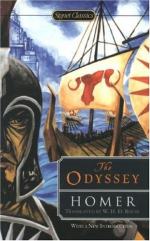Sainte-Beuve says, with reference probably to M. Leconte de Lisle’s prose version of the epics, that some people treat the epics too much as if the were sagas. Now the Homeric epics are sagas, but then they are the sagas of the divine heroic age of Greece, and thus are told with an art which is not the art of the Northern poets. The epics are stories about the adventures of men living in most respects like the men of our own race who dwelt in Iceland, Norway, Denmark, and Sweden. The epics are, in a way, and as far as manners and institutions are concerned, historical documents. Whoever regards them in this way, must wish to read them exactly as they have reached us, without modern ornament, with nothing added or omitted. He must recognise, with Mr. Matthew Arnold, that what he now wants, namely, the simple truth about the matter of the poem, can only be given in prose, ’for in a verse translation no original work is any longer recognisable.’ It is for this reason that we have attempted to tell once more, in simple prose, the story of Odysseus. We have tried to transfer, not all the truth about the poem, but the historical truth, into English. In this process Homer must lose at least half his charm, his bright and equable speed, the musical current of that narrative, which, like the river of Egypt, flows from an indiscoverable source, and mirrors the temples and the palaces of unforgotten gods and kings. Without this music of verse, only a half truth about Homer can be told, but then it is that half of the truth which, at this moment, it seems most necessary to tell. This is the half of the truth that the translators who use verse cannot easily tell. They must be adding to Homer, talking with Pope about ’tracing the mazy lev’ret o’er the lawn,’ or with Mr. Worsley about the islands that are ‘stars of the blue Aegaean,’ or with Dr. Hawtrey about ‘the earth’s soft arms,’ when Homer says nothing at all about the ‘mazy lev’ret,’ or the ’stars of the blue Aegaean,’ or the ‘soft arms’ of earth. It would be impertinent indeed to blame any of these translations in their place. They give that which the romantic reader of poetry, or the student of the age of Anne, looks for in verse; and without tags of this sort, a translation of Homer in verse cannot well be made to hold together.
There can be then, it appears, no final English translation of Homer. In each there must be, in addition to what is Greek and eternal, the element of what is modern, personal, and fleeting. Thus we trust that there may be room for ’the pale and far-off shadow of a prose translation,’ of which the aim is limited and humble. A prose translation cannot give the movement and the fire of a successful translation in verse; it only gathers, as it were, the crumbs which fall from the richer table, only tells the story, without the song. Yet to a prose translation is permitted, perhaps, that close adherence to the archaisms of the epic, which in verse become




